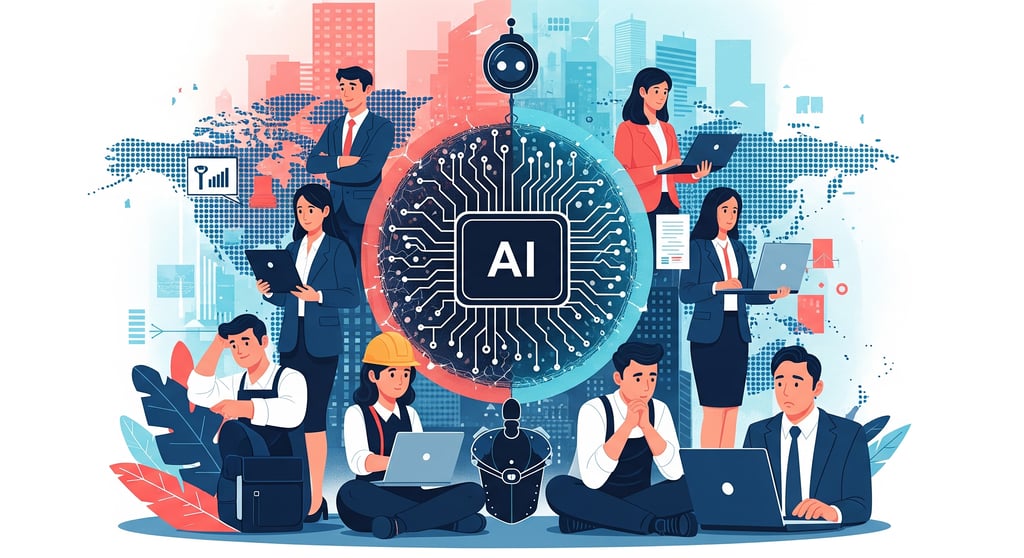Artificial Intelligence and Its Impact on Employment?: What You Need to Know
Understanding the Changing Landscape of Work in the Age of AI
nerdaskai.com
7/28/20253 min read


Artificial intelligence (AI) is no longer a concept from science fiction; it's a foundational technology that is actively reshaping our world. From healthcare diagnostics to personalized transportation, AI's influence is expanding rapidly, and the world of work is at the epicenter of this transformation. As AI systems become more sophisticated, they are creating unprecedented opportunities and significant challenges for the global workforce. This post explores the multifaceted impact of AI on employment, offering a balanced perspective on what you need to know to navigate the evolving job market.
The Double-Edged Sword: Automation and Job Creation
One of the most prominent discussions around AI is its potential for job displacement through automation. AI and robotics excel at performing routine, predictable, and data-intensive tasks far more efficiently than humans. This has led to significant changes in industries like manufacturing, data entry, and customer service. For instance, AI-powered chatbots now handle a large volume of customer inquiries, and algorithms can process and analyze vast datasets in seconds. A prominent 2023 report from Goldman Sachs suggests that generative AI alone could impact the equivalent of 300 million full-time jobs globally.
However, the narrative of mass job loss is incomplete. History shows that technological revolutions also create new industries and job roles. The rise of AI is no different. We are seeing a surge in demand for new professions such as AI/Machine Learning Engineers, Prompt Engineers, AI Ethicists, and AI System Trainers. The critical shift is from routine manual and cognitive tasks to roles that require uniquely human skills to build, manage, and work alongside AI systems. According to the World Economic Forum's Future of Jobs Report 2023, while 23% of jobs are expected to be disrupted, job creation is expected in fields like AI, big data, and sustainability.
The New In-Demand Skills for an AI-Driven Future
To thrive in an AI-integrated workplace, technical expertise alone is not enough. The most valuable workers will be those who can complement AI's capabilities. This requires a focus on developing a blend of skills:
Human-Centric & Soft Skills: As AI handles routine analysis, skills like creativity, critical thinking, complex problem-solving, and emotional intelligence become paramount. Humans are needed to ask the right questions, interpret AI-generated insights in a broader context, negotiate complex social situations, and lead teams.
Technical & Digital Literacy: A foundational understanding of AI concepts, data analysis, and digital tools is becoming essential across nearly all roles. This doesn't mean everyone needs to be a coder, but employees must be comfortable using AI-powered software and interpreting data.
Adaptability and Lifelong Learning: The pace of change is accelerating. The most crucial skill may be the ability and willingness to continuously learn, unlearn, and relearn. Workers must adopt a "lifelong learning" mindset to stay relevant as job roles evolve.
Navigating the Ethical Maze and the Need for Regulation
The integration of AI into the workplace raises significant ethical questions that cannot be ignored. AI systems used in hiring, for example, can perpetuate or even amplify existing biases if not designed and monitored carefully. The Stanford University Institute for Human-Centered AI (HAI) highlights the risk of algorithmic bias leading to discriminatory outcomes. Furthermore, the use of AI for workplace monitoring brings up serious concerns about employee privacy and autonomy.
In response, governments worldwide are beginning to act. The European Union is pioneering comprehensive legislation with its EU AI Act, which aims to establish risk-based rules to ensure AI systems are safe, transparent, and non-discriminatory. The United States is also exploring regulatory frameworks to promote responsible AI innovation while protecting workers' rights. These regulations will shape how businesses are allowed to deploy AI, particularly in high-stakes areas like employment.
How to Prepare for the AI-Powered Workplace
The prospect of such rapid change can be daunting, but proactive preparation is key. Here are four actionable steps you can take:
Embrace Lifelong Learning: Actively seek out courses, certifications, or workshops to ups--kill or res-kill. Platforms like Coursera, edX, and LinkedIn Learning offer numerous programs on AI, data science, and digital literacy.
Cultivate Your Human-Centric Skills: Focus on strengthening your abilities in communication, collaboration, creative problem-solving, and leadership. These are areas where humans continue to hold a distinct advantage.
Develop AI Literacy: You don't need to be an expert, but learn the basics of what AI is, how it works, and its limitations. Experiment with publicly available AI tools to understand their capabilities firsthand.
Advocate for Ethical Implementation: Be an informed voice in your workplace. Ask questions about how AI tools are being used, advocate for transparency, and be aware of your rights concerning data privacy and fair treatment.
Disclaimer and AI Disclosure
Legal Disclaimer: This blog post is for informational purposes only and does not constitute legal or financial advice. The information provided is based on publicly available data and sources as of the time of writing. Laws and regulations are subject to change and vary by jurisdiction. Please consult with a qualified professional for advice tailored to your specific situation.
AI Disclosure: This blog post was created with the assistance of AI tools to research, structure, and refine the content. All information was verified against the authoritative sources linked within the text.
Affiliate Marketing Disclaimer:
This page contains affiliate links. If you make a purchase through these links, I may earn a commission at no additional cost to you.
Credits: Gemini AI Images
